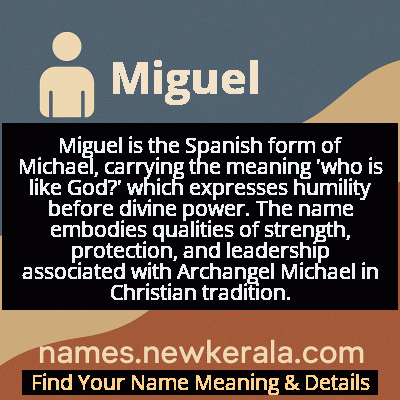Miguel Name Meaning & Details
Origin, Popularity, Numerology Analysis & Name Meaning of Miguel
Discover the origin, meaning, and cultural significance of the name MIGUEL. Delve into its historical roots and explore the lasting impact it has had on communities and traditions.
Name
Miguel
Gender
Male
Origin
Spanish
Lucky Number
4
Meaning of the Name - Miguel
Miguel is the Spanish form of Michael, carrying the meaning 'who is like God?' which expresses humility before divine power. The name embodies qualities of strength, protection, and leadership associated with Archangel Michael in Christian tradition.
Miguel - Complete Numerology Analysis
Your Numerology Number
Based on Pythagorean Numerology System
Ruling Planet
Uranus (Rahu)
Positive Nature
Strong sense of order, loyal, practical, and disciplined.
Negative Traits
Stubborn, overly serious, rigid, and prone to feeling restricted.
Lucky Colours
Blue, gray.
Lucky Days
Saturday.
Lucky Stones
Blue sapphire.
Harmony Numbers
1, 7, 8.
Best Suited Professions
Managers, engineers, accountants, organizers.
What People Like About You
Dependability, discipline, practicality.
Famous People Named Miguel
Miguel de Cervantes
Writer
Author of Don Quixote, considered the first modern novel
Miguel Hidalgo y Costilla
Revolutionary Leader
Father of Mexican Independence, initiated independence from Spain
Miguel Ángel Asturias
Writer
Nobel Prize in Literature 1967 for incorporating Mayan mythology
Miguel Cabrera
Baseball Player
Two-time AL MVP and Triple Crown winner, legendary hitter
Name Variations & International Equivalents
Click on blue names to explore their detailed meanings. Gray names with will be available soon.
Cultural & Historical Significance
In contemporary Hispanic culture, Miguel remains a name that bridges tradition and modernity. It represents both religious devotion and cultural continuity, often chosen to honor family traditions while connecting to broader Spanish-speaking heritage. The name appears frequently in popular culture, from telenovelas to international films, reinforcing its status as a quintessential Spanish name that transcends national boundaries. Its enduring popularity across centuries demonstrates how Miguel has evolved from strictly religious significance to embody broader cultural values of strength, creativity, and identity.
Extended Personality Analysis
Individuals named Miguel are often perceived as possessing strong leadership qualities combined with protective instincts, reflecting the name's association with Archangel Michael as a divine protector and warrior. They tend to exhibit confidence and determination, yet maintain humility - a characteristic embedded in the name's meaning 'who is like God?' which inherently acknowledges human limitations before divine power. Many Miguels display a blend of traditional values and modern adaptability, often serving as bridges between generations or cultures.
Their personality frequently includes a strong sense of justice and loyalty to family and community, coupled with creative or intellectual pursuits that honor the name's literary legacy. While individual personalities vary, the cultural archetype suggests someone who balances strength with compassion, authority with approachability, and tradition with innovation. Miguels are often seen as reliable pillars in their social circles, combining the warrior spirit of their namesake with the artistic sensitivity exemplified by famous bearers like Cervantes. This creates a personality profile that values both action and reflection, strength and empathy.
Modern Usage & Popularity
Miguel remains consistently popular in Spanish-speaking countries and among Hispanic communities worldwide, maintaining its status as a classic yet contemporary choice. In the United States, it has ranked within the top 200 male names for decades, with particular strength in states with large Hispanic populations like California, Texas, and Florida. The name enjoys cross-cultural appeal, often chosen by non-Hispanic parents who appreciate its melodic sound and strong cultural associations. Recent trends show Miguel being used in creative combinations and sometimes as a middle name to honor heritage, while its popularity is reinforced by contemporary famous Miguels in sports, entertainment, and literature. The name's versatility allows it to work equally well in formal professional settings and casual social contexts, ensuring it remains relevant across generations while maintaining its traditional roots.
Symbolic & Spiritual Meanings
Symbolically, Miguel represents the balance between strength and humility, power and service. The name embodies protection and justice through its connection to Archangel Michael, often symbolizing someone who defends the vulnerable and fights for what is right. It carries connotations of cultural bridge-building, representing the fusion of indigenous and European traditions throughout Latin America. The name also symbolizes artistic and intellectual achievement, inspired by Cervantes' literary legacy, making it representative of creative expression and cultural contribution. In modern contexts, Miguel often represents cultural pride and identity preservation within diaspora communities, serving as a linguistic and cultural anchor that connects individuals to their heritage while navigating contemporary global society.

